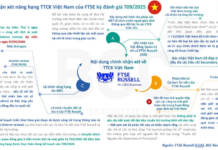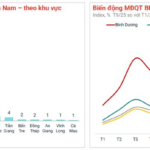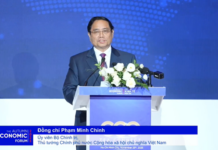On October 8th, the seminar titled “Upcoming Abolition of Presumptive Tax: What Should Businesses Prepare?” was held in Ho Chi Minh City, attracting hundreds of local business owners.
The seminar took place in the context of over 5 million businesses transitioning from presumptive tax to self-declared tax filing starting January 1, 2026. This marks a significant shift in their operations.

The seminar “Upcoming Abolition of Presumptive Tax: What Should Businesses Prepare?” held in Ho Chi Minh City on October 8th. (Photo: Đ.V)
Concerns from Business Owners
Mr. Lê Phương Nam, a business owner in the floral accessory industry, shared that he often purchases raw materials in bulk, transforming them into finished products for sale. For instance, he buys a ton of paper and converts it into A4 sheets or bags. When maintaining accounting records, the input and output units often don’t align, not to mention material shrinkage.
Additionally, many inventory items and raw materials lack clear input documentation, leaving him unsure how to declare output.
“Currently, we manage 500-600 product lines, making accurate quantity tracking for declarations extremely challenging. I’m concerned about potential errors. If we make mistakes, will we be penalized? What support can we expect to comply with the law?” Mr. Nam questioned.

Representatives of Ho Chi Minh City businesses voice their concerns. (Photo: Đ.V)
Mr. Chiến, a pharmacy owner, mentioned using electronic cash registers but primarily serving individual customers. He wondered if he could consolidate multiple small daily transactions into a single invoice.
According to Mr. Chiến, issuing separate invoices for each customer significantly increases costs, including digital certificate fees, electronic invoice purchases, and software system maintenance.
“Each customer buys a few small items. If every purchase requires an invoice, it severely impacts our profits,” Mr. Chiến noted.
A representative from Minh Hiếu business, which sells baozi both in-store and online, asked whether e-commerce revenue requires invoicing. If so, would this revenue be deducted from declarations since platforms already collect and remit taxes on their behalf?
Mr. Mai Sơn, Deputy Director of the Tax Department – Ministry of Finance, stated that small businesses typically have minimal inventory, while larger businesses, accustomed to documentation and invoicing, operate under self-declaration.

Mr. Mai Sơn, Deputy Director of the Tax Department – Ministry of Finance. (Photo: Đ.V)
Regarding concerns about consolidating individual invoices, Mr. Sơn assured that the tax authority would study the issue. However, businesses shouldn’t view invoicing as a cost increase, as even convenience stores and mini-markets issue invoices for small purchases like needles and thread.
“This process is convenient because receipts from POS systems automatically become invoices with minimal expense. We’ll consider this issue, but buyers need invoices for potential complaints. Invoicing not only ensures tax transparency but also clarifies product origins,” Mr. Sơn explained.
Mr. Sơn added that tax authorities would survey to implement regulations aligned with reality, ensuring taxable profits only when businesses are profitable. The tax department has been actively communicating regulations to prevent penalties due to misunderstandings.
“We also urge local authorities to support businesses during this transition. The Tax Department’s policy and legal divisions will minimize violations and penalties, so please rest assured,” Mr. Sơn affirmed.
According to Mr. Sơn, proper invoicing not only clarifies revenue and expenses but also proves product origins to market management authorities.
Proposal to Waive First-Time Penalties
From a local management perspective, Mr. Nguyễn Xuân Thành, Deputy Chairman of An Đông Ward People’s Committee, shared that An Đông Ward has 3,902 businesses, contributing 26% of the ward’s total tax revenue last year and employing thousands of locals.
Mr. Thành emphasized that abolishing presumptive tax promotes transparency and fairness in tax policies. This encourages businesses to transition to corporate models, facilitating credit access and digital transformation (through online declarations and sales).
On behalf of An Đông Ward’s businesses, Mr. Thành proposed five support measures for the transition:
First, intensify communication with direct guidance and informational flyers covering key aspects (transition timeline, benefits, government and tax authority support, pre- and post-January 1, 2026 tasks, and online consultation channels).
Second, provide free software for at least the first year and training. Third, establish a hotline for operational and technical support. Fourth, recommend affordable, reputable accounting firms. Fifth, propose waiving penalties for first-time violations to encourage compliance.
Mr. Nguyễn Quang Huy, Director of VIB Bank’s SME Division, announced partnerships with technology companies and payment intermediaries to offer nearly free solutions for transitioning businesses, including digital signatures, e-invoicing, sales software, and integrated technology platforms.
“All transactions can now be completed on a single smartphone app, integrating sales and banking software. Invoices are automatically stored in the cloud, eliminating paper records and manual signatures,” Mr. Huy explained.
Mr. Huy added that when tax authorities or regulators request information, retrieval and verification will be faster and easier. VIB Bank continuously invests in technology to support businesses during this transition.
Additionally, the bank advises and connects businesses with technology companies to provide free benefits, ensuring a successful transition in this critical period.
According to the Tax Department, approximately 5 million businesses must switch to self-declaration, calculation, and tax payment by December 31, 2025. This massive change requires substantial preparation, especially in areas with high business concentrations.
In Ho Chi Minh City, as of September 17, 2025, the Tax Department manages 361,879 businesses. Of these, 243,356 are in the original Ho Chi Minh City area, 87,364 in former Binh Duong, and 31,159 in former Ba Ria – Vung Tau.
Among these, 19,060 businesses already file taxes through self-declaration, while 257,389 (over 71%) operate under presumptive tax, accounting for over 93% of taxable businesses.
Jack’s J97 Promotion Company Announces Payment of Fine for Press Conference Incident
The event sparked controversy as the majority of its over two-hour runtime focused on personal issues rather than the promised musical showcase.
Billion-Dollar Infrastructure Unlocks Potential: Can Gio Emerges as Ho Chi Minh City’s Coastal Growth Hub
Following its administrative boundary expansion, Can Gio is no longer a remote coastal district isolated from Ho Chi Minh City’s center. With a series of multi-billion-dollar infrastructure and urban development projects currently under study and implementation, this region is poised to transform into a vibrant economic gateway to the sea and emerge as a premier entertainment and leisure hub. This potential is further amplified by the future connection between Can Gio and Vung Tau, bridging the two shores and unlocking unprecedented opportunities.













































